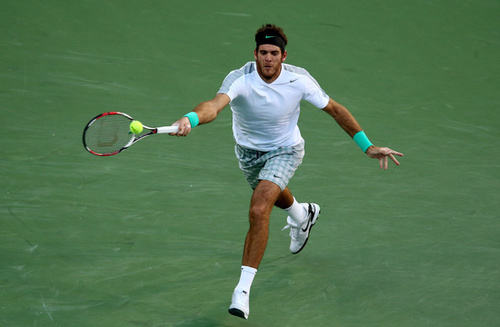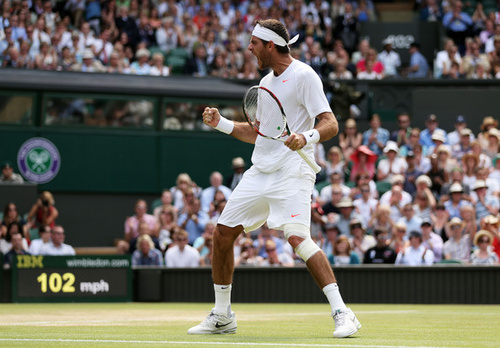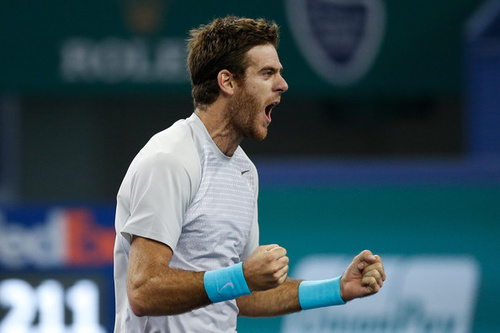Don't miss any stories → Follow Tennis View
FollowATP Unsung Hero of the Year: Juan Martin Del Potro
Nobody who watched the 2009 US Open can forget the fearless, explosive tennis unleashed at that tournament by Juan Martin Del Potro. Merely a trendy dark horse when the tournament began, the Tower of Tandil swatted aside Rafael Nadal and Roger Federer over the final weekend to claim his first major title. At the time, that breakthrough looked certain to ignite a series of similar successes for Del Potro, whom many perceived as the future of the ATP.
But those predictions would crumble months later when a wrist injury exiled the Argentine from the game for an extended period. After he returned late in 2010, moreover, Del Potro could not recapture the same courage that fueled his spectacular US Open surge. He produced relatively steady results, dominating most opponents outside the top 10 and returning to that group himself. On the other hand, his clashes against the ATP’s leading superstars followed the same discouraging script again and again. Del Potro could threaten Nadal, Federer, or Novak Djokovic at times, yet he almost invariably succumbed in the end. Whenever he did strike a blow against one of them, such as winning an Olympic bronze medal from Djokovic, he could not build on that momentum.
By early 2013, Del Potro seemed in danger of fading permanently into stagnation amid questions of what might have been. A first-week loss at the Australian Open inspired little confidence in him, so he arrived at the Masters 1000 tournament in Indian Wells with little fanfare. Flying under the radar may have suited the quiet Argentine, however, for he mounted his most impressive single-tournament effort since 2009 in the desert.

The familiar narrative started to unfold in a quarterfinal against Andy Murray, whom Del Potro had not faced since his wrist surgery. An edgy first set by both men ended in a tiebreak decided by his tentative play on key points. This battle of US Open champions turned decisively, however, when Del Potro started to swing freely during the last two sets. A day after he overpowered Murray, he again dropped a tense first set to a fellow US Open champion in Djokovic. No man had rallied from losing the first set to defeat the Serb on an outdoor hard court since 2009, so the situation was desperate. Yet Del Potro found the poise deep in a thrilling third set to inflict Djokovic’s first loss of the season. He would fall just three service holds short of his first Masters 1000 title, denied by an even more determined Nadal.
Despite that disappointment, Del Potro had strung together three brilliant performances against the three best players in the ATP this year, who have combined to win 11 of the last 12 majors. Not since his initial breakthrough in 2009 had he shown the ability to sustain his best tennis when it mattered most. Adversity soon struck again, though. Fatigue and illness would undermine Del Potro throughout the spring before forcing him to withdraw from Roland Garros. As the summer hard courts beckoned, he could have been forgiven for looking past the grass season, when he rarely has thrived.
Never had Del Potro reached the quarterfinals at Wimbledon, his least productive major. Considering his lack of matches during the spring, the rusty Argentine looked vulnerable to an early upset. Instead, Del Potro would charge to the semifinals without dropping a set, defying the low bounce of a surface poorly suited for tall baseliners with long swings. He received a comfortable pre-quarterfinal draw, to be sure, but his victory over David Ferrer in the last eight impressed by reversing the result of their Wimbledon encounter a year before. Even more impressive was Del Potro’s ability to overcome an alarming knee injury by playing with disciplined aggression and relentless focus.

Aligned against Djokovic in the semifinal, the Argentine stood toe to toe with a former Wimbledon champion across the course of five whiplash-inducing sets. Although he could not edge across the finish line, his spirited comebacks from multiple deficits revealed a competitor confident in his place among the elite. Gone was the diffidence of his post-surgery struggles, when he often looked content to serve as a worthy sparring partner for his fellow major champions. At Wimbledon, as at Indian Wells, Del Potro seemed to remind himself that he belonged.
His battered body betrayed him during the US Open Series, but not before he had notched the second of four ATP 500 titles this season. A second-round exit in New York to Lleyton Hewitt, a chronic nemesis of his, did not dishearten Del Potro ahead of the fall tournaments. He took full advantage of his opportunities during the season’s final phase, winning 15 of his next 16 matches after the US Open. The most notable of those victories turned a new leaf in a matchup against a key rival.
In 2009, Del Potro had swept three straight meetings with Nadal, culminating with a stunningly dismissive rout in a US Open semifinal. The momentum had shifted decisively after his wrist surgery, when the Spaniard had swept four meetings on all three major surfaces. To underline his resurgence, therefore, Del Potro needed to prove that he could solve Nadal again. And he did, stifling the year-end world No. 1 in Shanghai with a seamless display of power tennis that left no loopholes from start to finish. Del Potro nearly upset Djokovic in the final of that Masters 1000 tournament, stopped only in a final-set tiebreak. Still, he had come within a few points of defeating the top two players in the world on consecutive days, a feat reminiscent of that US Open fortnight four years before.

Del Potro will enter next year with much still to prove. He could not stay healthy this year for as long as a contender should, hobbled by ailments in multiple areas. If he aims to collect more majors, the Argentine cannot afford to continue confronting choices between withdrawing from tournaments and playing in depleted form. Nor can he afford to lose in the first week at both hard-court majors in the same season, as he did this year.
Nevertheless, those concerns should not overshadow the statement of resurgence that Del Potro delivered this year. A three-set victory over Federer in the ATP 500 tournament at Basel ensured that Del Potro would end 2013 as the only man to defeat every member of the Big Four (Nadal, Djokovic, Murray, Federer) this season. He also would finish the season in the top five for the first time since 2009, and his early exit at the 2013 Australian Open suggests that he could crack the top three with a solid start to 2014.
Having tottered along the brink of underachievement, the Tower of Tandil towers again. And the ATP is a more interesting place with its tower restored.










